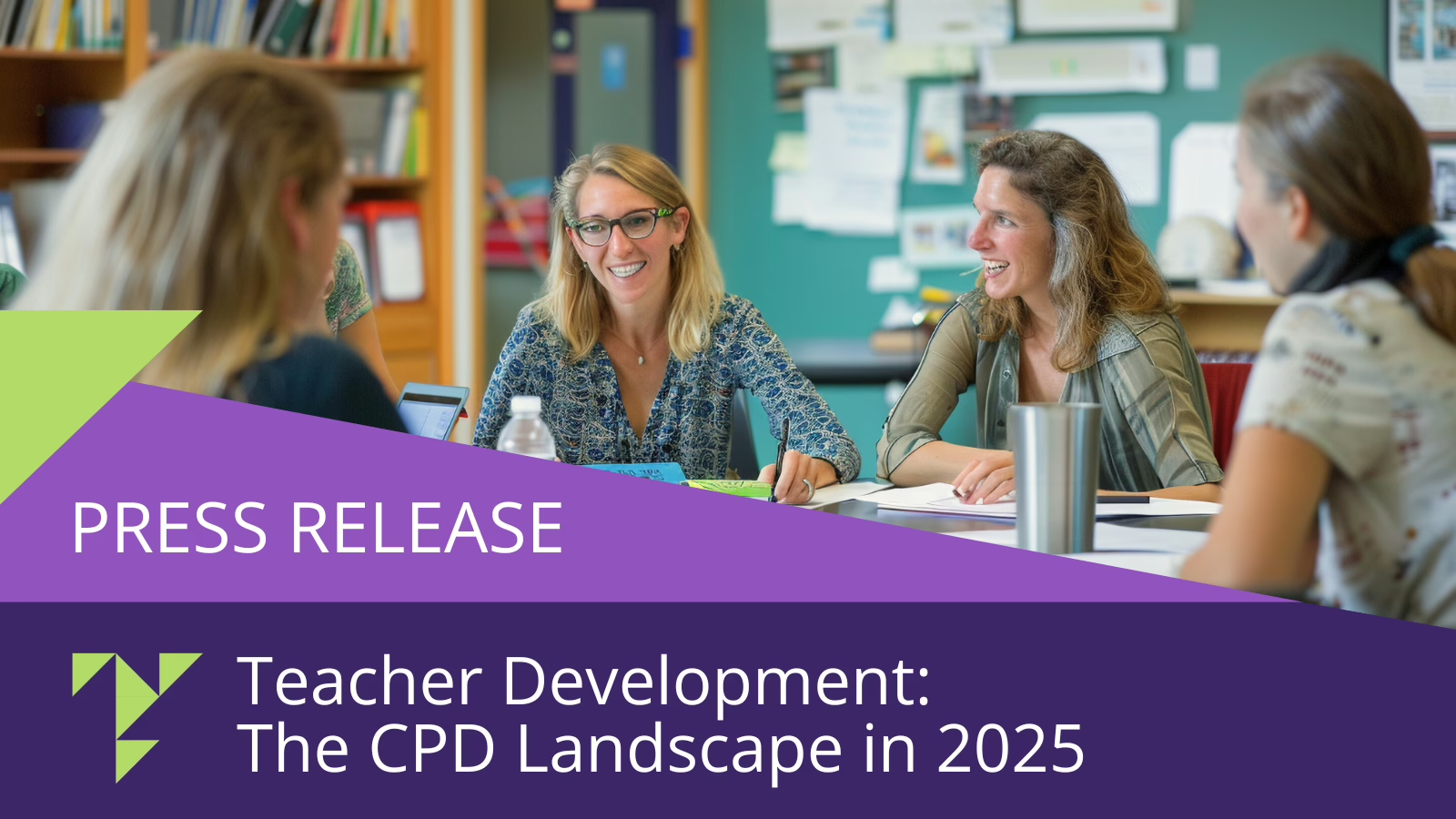First comprehensive study of CPD in English schools reveals a stark disconnect between investment and impact, with nearly 40% of teachers saying professional development hasn’t clearly improved their ability to do their job.
Around £1 billion is spent annually on teacher professional development in England, yet only one quarter of teachers believe their CPD adequately takes pupil needs into account, according to a landmark new report published today by education charity Teacher Development Trust.
Based on a survey of over 1,000 teachers and school leaders, Teacher Development: The CPD Landscape in 2025 is the first comprehensive study focused exclusively on continuing professional development in schools in England – and reveals a troubling gap between investment and impact.
It provides the first comprehensive picture of how more than a decade of CPD investment and reform is actually experienced by teachers and school leaders in their day-to-day practice.
Key findings include:
- Nearly 40% of teachers and leaders say CPD has not clearly improved their ability to perform their role, with classroom teachers more likely than senior leaders to report limited impact (46% vs 33%)
- Around one in five teachers (18%) spent less than a single day on formal CPD during the 2024/25 academic year – equivalent to over 112,000 teachers nationally
- Only 24% of teachers say CPD adequately considers the needs of students, despite this being the ultimate purpose of teacher development
- Time remains the critical barrier, cited by 67% of respondents, with many reporting CPD lacks relevance, follow-up support, or connection to their specific needs
- Significant perception gaps exist between leaders and teachers: 33% of leaders believe teachers’ needs are effectively identified, compared to just 16% of teachers themselves.
- Teachers aren’t getting the training they need: Teachers identify SEND (39%), technology integration (34%), and leadership (29%) as top development priorities, yet many report insufficient opportunities to address these needs
The report was commissioned to understand whether substantial policy focus and investment in teacher development over the past decade is translating into meaningful impact in classrooms.
Gareth Conyard, Chief Executive of the Teacher Development Trust, said: “This report offers a unique insight into how teachers and school leaders are responding to more than a decade of CPD reforms. Nobody should doubt the importance of focusing on evidence when it comes to professional development – the key element of recent reforms – but this report shows that it isn’t enough by itself. When only one in four say professional development adequately considers pupil needs, and only one in ten say it considers their needs then something is going wrong. We can see a system full of good intent, but riven with competing structures and pressures that mean school leaders and teachers just don’t have the time or support to make the best choices. That has to change if we don’t want to see money being wasted.”
The report shows that teachers and school leaders try to find the time and resources to engage in their own development, and the intent behind CPD programmes is generally good. 89% of teachers engage in informal professional learning such as reading research, listening to podcasts, or professional conversations with colleagues. When teachers do access high-impact formats like coaching, conferences, or peer observation, they’re significantly more likely to report improvement in their practice.
But the report also uncovered concerning findings:
Access and quality issues:
- Nearly a quarter of respondents (23%) reported no CPD structures in place within their school, rising to 27% in primary settings
- Only 22% of teachers accessed coaching, despite evidence this is among the highest-impact forms of professional development
- Search engines are the most common starting point for finding CPD (24%), ahead of professional networks or quality-assured sources
Leadership and strategy gaps:
- More than six in ten schools place CPD responsibility with a member of the senior leadership team without dedicated time; only 7% have a specified CPD leader role
- One in ten respondents reported no clear CPD leader at all in their setting
- Only 29% of teachers say the rationale and intended impact of CPD is clearly communicated, and just 26% describe it as directly applicable to their role
Evaluation weaknesses:
- 18% of respondents say CPD is not evaluated in their setting
- Where evaluation does happen, pupil feedback is the least common method (25%)
- Only 15% of teachers report receiving ongoing support to implement what they’ve learned
The link to retention is particularly striking: 70% of teachers stated that CPD addressing workload and wellbeing would increase their likelihood of remaining in the profession, with personalised development (68%) and protected reflection time (64%) also ranking highly. Yet these are among the least commonly provided structures.
The report also reveals a stark mismatch between what teachers say they need and what they’re receiving. When asked about their most pressing professional development needs, SEND topped the list at 39%, followed by technology integration (34%) and leadership (29%). Yet many teachers report feeling “inadequately prepared to meet the needs of diverse learners” in their classrooms, particularly as SEND provision becomes increasingly stretched.
Open-ended responses from teachers paint a picture of professionals struggling with systemic pressures that CPD alone cannot address. One teacher wrote: “I feel inadequately prepared to meet the needs of diverse learners within class settings when there are a number of students with SEND in the same class and no TA or other support.” Another noted: “How to manage the vast range of needs, some far more complex and demanding, that take time from the class teacher to support that child at a huge detriment to the other children.”
The barriers to effective CPD emerge clearly in teachers’ own words. When asked why professional development hadn’t improved their ability to perform their role, common themes included lack of relevance (“Lots of CPD is repetitive and does not take into account the individual’s experience or skills. It seems to be ‘one size fits all'”), insufficient time to implement (“Staffing levels have meant that I don’t have the time or resources to implement some of the training I have had”), and a sense that it’s become a compliance exercise (“Felt like a box ticking activity”).
Where CPD does work, teachers describe it very differently. One respondent praised coaching that “significantly changed the way I teach lessons and made my lessons more productive.” Another described subject-specific training as “the best CPD I have received in years” precisely because it was relevant, practical, and gave time to collaborate with colleagues.
Gareth Conyard added: “Teachers are desperate for high-quality professional development—they’re engaging with it informally in huge numbers. What’s missing is a system that makes it easy for them to access the right CPD at the right time, led strategically, and genuinely connected to improving outcomes for pupils.”
The report sets out urgent recommendations across three levels:
For government and policymakers:
- Recognise and resource CPD leadership as a strategic function within schools and MATs, not an add-on responsibility
- Undertake a comprehensive audit of current CPD spending to understand value for money
- Create a single, quality-assured portal to help teachers navigate the crowded CPD marketplace
- Extend provision beyond early-career frameworks and NPQs to better serve mid-career and classroom-focused teachers
- Commission an independent review of the Teachers’ Standards for Professional Development, unchanged since 2016
For school leaders:
- Make CPD leadership a defined, specialist role with dedicated time and authority
- Establish robust processes for identifying needs, gathering feedback, and evaluating impact
- Designate and protect time for staff to engage in various forms of CPD
- Ensure internal staff delivering CPD are well-equipped and supported
For teachers:
- Take ownership of individual CPD needs and research the best options
- Engage with organisations promoting effective CPD
- Reflect on impact to inform future opportunities
“The good news is that the sector already has much of the intent and investment needed,” Conyard concluded. “What’s missing is meaningful coordination, strategic leadership, and a system that genuinely responds to what teachers and pupils need. “We’re not saying CPD doesn’t work – the evidence is clear that high-quality professional development is one of the most powerful levers for school improvement. We’re saying the current system isn’t working well enough, and that’s something we have a collective duty to fix.”
The Teacher Development Trust plans to repeat the research regularly to track progress over time, creating a longitudinal picture of CPD provision and impact in England.
ENDS
Notes to editors
- Teacher Development: The CPD Landscape in 2025 is based on a nationally representative survey of 1,085 teachers and school leaders in England, conducted by YouGov between 22 May and 5 June 2025. The full report is appended to this email
- The estimated £1 billion annual spending on CPD includes:
- Approximately £590m for teacher time during INSET days
- £150m on the Early Career Framework
- £15m on National Professional Qualifications (estimated)
- £50m on various hub initiatives (estimated)
- £225m in direct school spending (based on analysis by SchoolDash)
- The Teacher Development Trust is a national charity founded by teachers and school leaders in 2012, dedicated to helping leaders build stronger schools through effective professional development.
- For interview requests or further information, contact: Anne Cameron, Director of Partnerships and Impact, on anne.cameron@teacherdevelopmenttrust.org.




